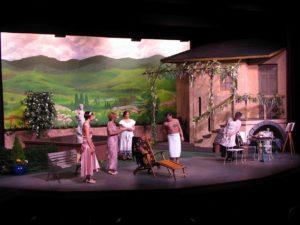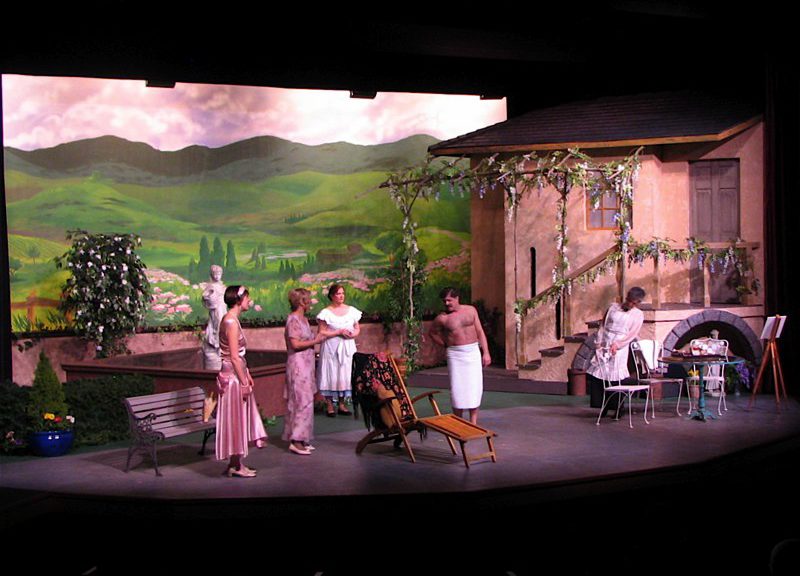I’ll get back to “Love Song”. I promise. But first i want to talk about another play.
I think the hardest play to direct is a one person play. I have never had the opportunity to find the actor/play combination that would work. First, the time commitment of the actor in a one actor, 90 to 120 minute play is monstrous: Memorizing the lines, finding ways to make it visually interesting and most importantly the ability to become all the other characters in the play makes the challenges almost insurmountable. In a multiple person play, the actor has someone on stage with then they can rely upon if they go up on their lines or lose their place in the play. It’s a whole different situation when you are on stage by yourself.
I have directed a couple of two person plays and find them really challenging.
I need to digress for a moment.
One of the rules for directing required the director to honor and illuminate the “intent” of the playwright in presenting the play. In some cases (“Arthur: The Begetting” and “Torso”, for example) I have built some degree of a relationship with the playwright and can ask them when I have questions as to their intent in a specific part of the play. Other playwrights are too important for me to bother (Me? Call Neil Simon? Never happen.) And still others are dead. (Hey Will (Shakespeare), what did you mean in this scene?)
In 2007 I directed the play “Enchanted April” by Matthew Barber, from the novel by Elizabeth von Armin. Here we have a double layer of interpretation: My interpretation of Barber’s interpretation of the von Armin book. I went back and read the book and I disagreed with some of Barber’s interpretation of the story. What do I do? In this particular case, I had seen two other productions of the play: One at a very small theater in Olympia, Washington and one at a large community theater in Ocala, Florida. In both cases, their interpretation of a specific part of the play was the same but I thought then and still think seven years later that their interpretation was wrong. Not just a little bit wrong but, to me, wrong enough to ruin the impact of the play.
I know I’m wandering from my main point but I want to follow this thought.
Enchanted April takes place in London and Italy in the 1920’s. Four women, who all have major troubles in their lives meet and spend a month in Italy, ultimately solving their personal issues that make the play tick. One of the women, Rose, had become distanced from her husband for (initially) unknown reasons. In his loneliness, he socializes a lot without his wife. He has met a beautiful, young woman (Lady Caroline) who, unknown to him, is one of the four women going to Italy. In the first act (which takes place in London), we see the growing distance between Rose and her husband. We see that he, at least, loves his wife very much but together they are unable to bridge the growing distance between them. In the second act, we see how sad Rose is and how much she misses her husband and how unhappy she is. One of the other women (Lottie) assures Rose that her husband will come to Italy to be with her.
Now to the point of all of this: Late in the second act (just before Roses husband arrives to meet with Lady Caroline), Rose tells Lottie that the reason he won’t come is because she (Rose) can’t love him. Rose bases this on the fact that they had a child that died.
Now my interpretation: Rose can’t love him (in a physical sense, not the emotional sense) because she can’t stand the pain of losing another child. Remember, this is in the 1920’s when birth control was no really available. Anyway in both the Olympia and Ocala productions, the two actors were sitting on the floor in a remote area of the stage during this discussion (as called for in the script). In my production I had the two actors standing at the very edge of the stage, as close to the audience as i could get them. I had Rose, with tears streaming down her face, shout her line: “Lottie, I lost my child.” Lottie used her thumbs to wipe away Roses tears as she assures her everything will be okay. Of course, everything does end happily.
At the very end of the play, Lottie faces the audience and tells them “That they all gathered in Italy again the following year and . . . there would be a new child. . . .” Without my interpretation that last line doesn’t mean anything.
A very different interpretation but who is to say that mine isn’t the way the author intended it?
When I direct a play, I spend two months in heavy study and analysis of the script, then two months of rehearsals then one month of performances. For me to spend this kind of time on a play, it has to have a message that I MUST tell people. It is that vision that I HAVE to bring to the stage. It is the lesson the audience MUST learn. That’s one reason that I read close to 100 plays in order to find one that moves me to the point where I HAVE to direct it.
King Lear is in that boat but I haven’t found the right actors to populate it and probably never will. One Bucket List item that will never get checked off.
But enough wanderings for today.
Doug




